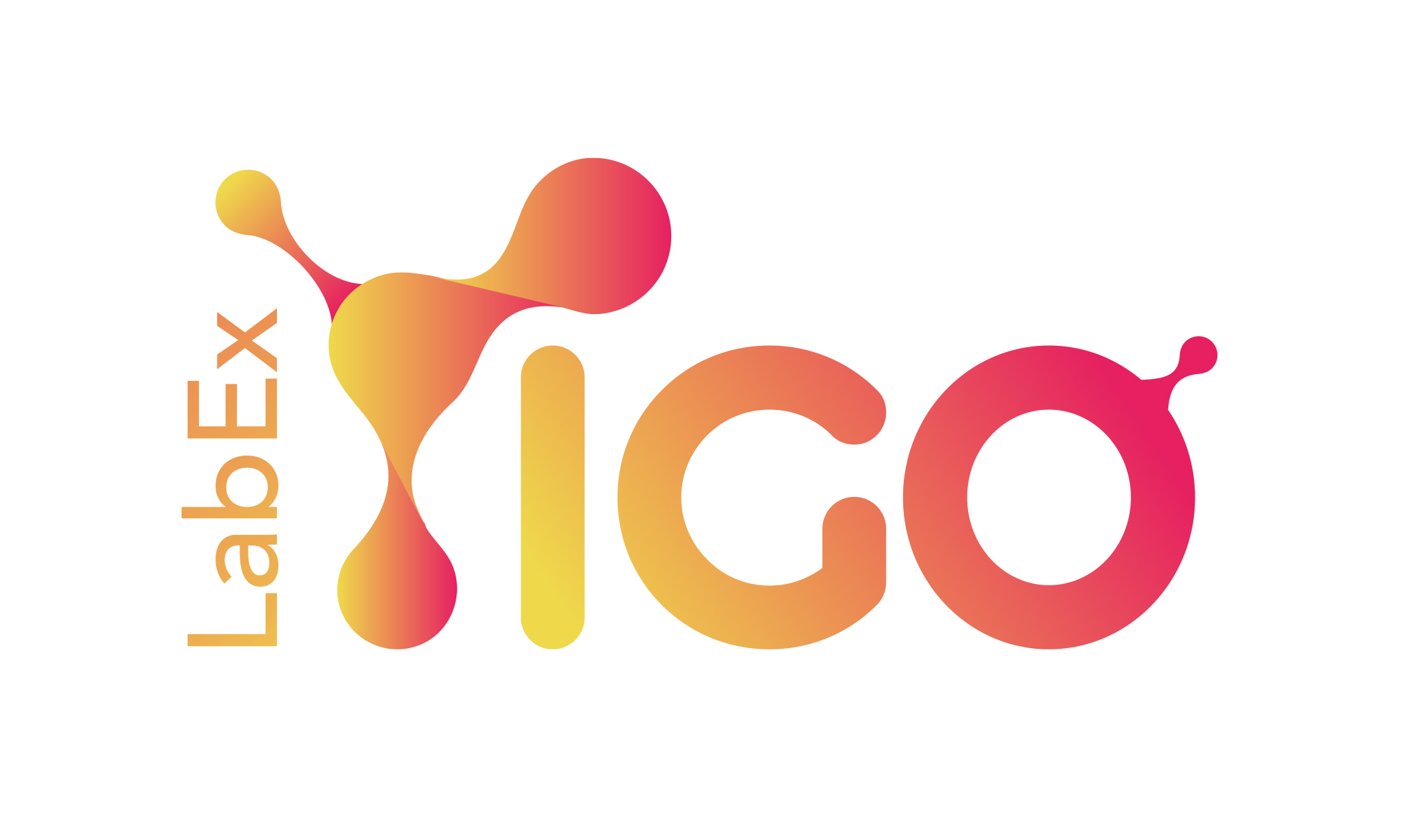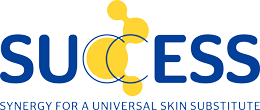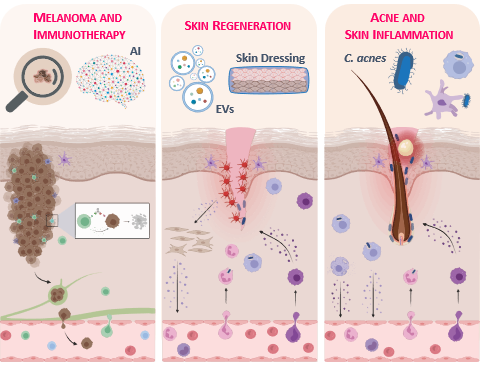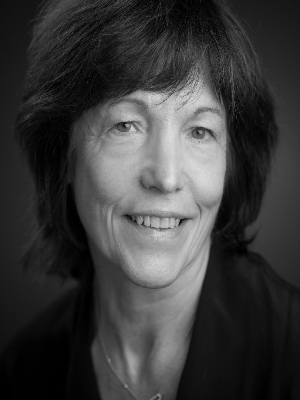The Incit teams
Team 2
Clinical and translational research in proliferative and inflammatory skin diseases.

Objectives of the research programs
Our projects aim to improve the management of patients with skin cancers and severe skin dysbiosis, ranging from epidemiology to the development of innovative therapeutic strategies, including artificial intelligence.
Research projects
Our work is organised around 5 programmes, grouped into two main research areas:
Melanoma and Immunotherapy
Clinical research, focused on the development of immunotherapies in cutaneous cancers, the implementation of clinical trials in inflammatory pathologies involving the cutaneous microbiome, such as acne; the optimisation of production processes for therapeutic TILs, and the monitoring of a national database on clinical data from melanoma patients (RicMel). Coordinated by A. Khammari and B. Dreno
Identification of molecular/immunological signatures associated with clinical responses and severe adverse events in patients treated for melanoma, and the development and validation of artificial intelligence algorithms that allow the characterisation of peri-cicatrical helioderma, as a surrogate marker for TMB, to predict patient response to immunotherapy, by exploring the immune and molecular mechanisms behind this correlation Coordinated by L. Boussemart and M. Denis
Melanoma epidemiology and prevention, with the development of new analysis methods and the optimisation of prevention strategies. Coordinated by C. Rat and G. Quereux
Skin inflammation
Characterisation of the diversity and interactions of skin commensal bacteria such as acnes and S. epidermidis on the control of cutaneous innate immunity using acne as a model. Coordinated by S. Corvec and B. Dreno
The development of a regenerativeskin dressing based on a secretome of immortalised foetal keratinocytes and fibroblasts. Coordinated by B. Dreno and A. Khammari
Graphic summary
Highlights
Dreno et al. Phase I/II clinical trial of adoptive cell transfer of sorted specific T cells for metastatic melanoma patients.
Cancer Immunol Immunother 2021



Themes addressed
Clinical research in skin diseases
Coordinated by A. Khammari and B. Dreno
Artificial intelligence and melanoma
Coordinated by L. Boussemart and M. Denis
Epidemiology and prevention of melanoma
Coordinated by C. Rat and G. Quereux
Control of cutaneous innate immunity by skin commensal bacteria
Coordinated by S. Corvec and B. Dreno
Regenerative Skin Dressing
Coordinated by B. Dreno and A. Khammari
The Research Team
5 University professors / Hospital practitioners
5 Engineers
- K. Ducoin, IR
- F. Marouf, IE
- C. Berthebaud, IE
- J. Saenz, IR
- T. Roret, IR
Post doc
- ________
2 project managers
2 PhD students
- Morgane Angibaud
- Louise Ruffier d'Epenoux
1 Lecturer / Hospital practitioner
- G. Herbreteau, MCUPH
The Clinical Team
e6 Clinical Research Associates
- J. Cassecuel
- C. Dabrowski
- Mr Denyset
- V. Rousselet
- Mr. Thabot
- Roxane Mathieu
6 ITA
- S. Charpentier, IE
- A. Daminette-Normand, TCH
- C. Leroy, TCH
- A. Mordelet, TCH
- A. Vallee, IE
- L. Minier, TCH
2 Clinical research nurses
- A. Boisrobert
- C. Montfort
Scientific publications
Find the major publications of the team for the last 2 years.
Cutibacterium acnes and Staphylococcus epidermidis: the unmissable modulators of skin inflammatory response.
Dagnelie MA, Corvec S, Timon-David E, Khammari A, Dréno B.
Exp Dermatol. 2022 Mar;31(3):406-412. doi: 10.1111/exd.14467.
Positive Association Between Location of Melanoma, Ultraviolet Signature, Tumor Mutational Burden, and Response to Anti-PD-1 Therapy.
Dousset L, Poizeau F, Robert C, Mansard S, Mortier L, Caumont C, Routier É, Dupuy A, Rouanet J, Battistella M, Greliak A, Cappellen D, Galibert MD, Allayous C, Lespagnol A, Gerard É, Kerneuzet I, Roy S, Dutriaux C, Merlio JP, Vergier B, Schrock AB, Lee J, Ali SM, Kammerer-Jacquet SF, Lebbé C, Beylot-Barry M, Boussemart L.
JCO Precis Oncol. 2021 Dec 16;5:PO.21.00084. doi: 10.1200/PO.21.00084. eCollection 2021.
Phase I/II clinical trial of adoptive cell transfer of sorted specific T cells for metastatic melanoma patients.
Dréno B, Khammari A, Fortun A, Vignard V, Saiagh S, Beauvais T, Jouand N, Bercegay S, Simon S, Lang F, Labarrière N.
Cancer Immunol Immunother. 2021 Oct;70(10):3015-3030. doi: 10.1007/s00262-021-02961-0.
Transcriptomics Analysis Indicates Trifarotene Reverses Acne-Related Gene Expression Changes.
Dreno B, Chavda R, Julia V, Khammari A, Blanchet-Réthoré S, Krishnaswamy JK.
Front Med (Lausanne). 2021 Oct 22;8:745822. doi: 10.3389/fmed.2021.745822. eCollection 2021.
Effectiveness and safety of nivolumab in patients with advanced melanoma: A
multicenter, observational study.
Monestier S, Dalle S, Mortier L, Dutriaux C, Dalac-Rat S, Meyer N, Leccia MT, Mansard S, Montaudié H, Saiag P, Combemale P, Guillot B, Skowron F, Duval Modeste AB, Bénéton N, Hainaut E, Robert C, Arnault JP, Le Corre Y, Jouary T, Ameur N, Varey E, Khammari A, Dréno B; RIC-Mel network.
Int J Cancer. 2021 Jun 1;148(11):2789-2798. doi: 10.1002/ijc.33467. Epub 2021 Feb 19.
Contact
Centre
Nantes
Location
IRS2, Nantes University
22 Boulevard Benoni Goulin
44000 Nantes
About us
Created in 2022, the INCIT(Immunology and New Concepts in Immunotherapy) research unit, directed by Frédéric Altare, is based on the desire to focus thescientific expertise of the immunology and immunotherapy teams on different pathological contexts: inflammation, cancer and infectious diseases.




